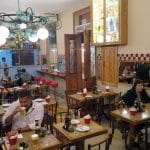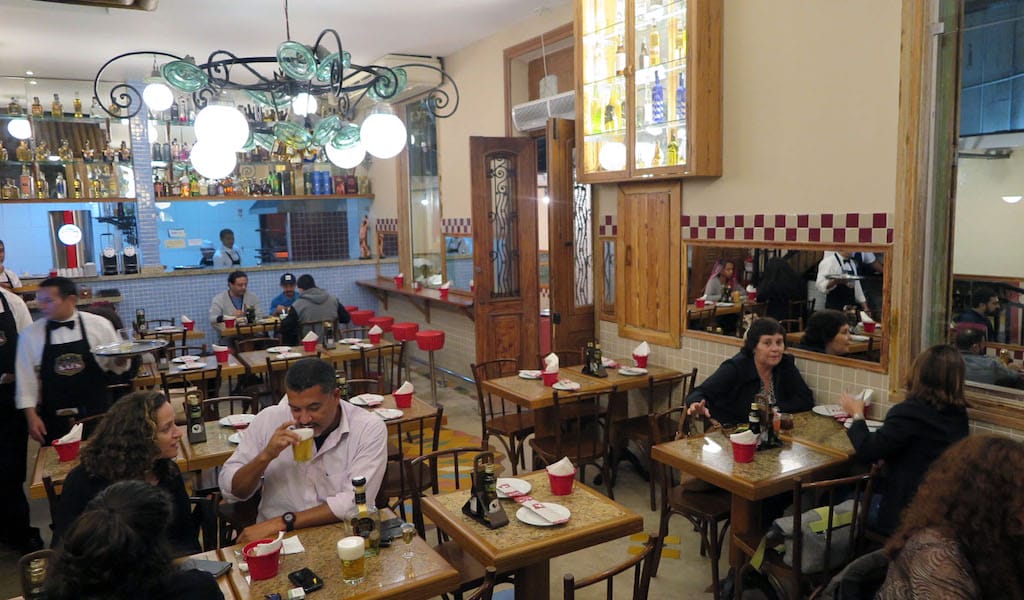Editor’s note: We are sad to report that Mussalem has closed.
The second-richest man in the world. A five-foot-two, billboard-topping, belly-dancing bilingual pop singer. A right-wing São Paulo governor, mayor and congressman wanted in the U.S. on charges of money laundering of the multimillion-dollar order. Three presidents of Ecuador and one of Colombia. Together they speak to a hemispheric truism: In Latin America, Lebanese immigrants and their descendants are a force to be reckoned with.
(Carlos Slim Helú is the Mexican telecom tycoon and New York Times creditor; Colombian singer Shakira’s name means “grateful” in Arabic; Paulo Maluf, whose renown abroad is mostly limited to Interpol, carries a name that has become synonymous with corruption for Brazilians. Julio Teodoro Salem, Abdalá Bucaram, Jamil Mahuad and Julio César Turbay Ayala all occupied their countries’ highest offices in the 20th century.)
Immigrants from Lebanon and neighboring Syria came in high numbers to Latin America around the turn of the 20th century in search of a better life and after sometimes facing religious persecution and oppression. (Many Arabs in Latin America are Christian.) Brazil’s population of Lebanese and their descendants is now larger than the population of Lebanon itself. On the other side of the continent, Chile has the largest Palestinian community outside of the Middle East, many of whom came before the creation of the state of Israel.
 Brazilians often refer to those of Arab descent as turco, a reference left over from the fact that many early immigrants had passports issued by the Ottoman Empire. When describing 19th- and 20th-century migration to Latin America, the Lebanese Embassy in Brasília writes: “This is the period of adventures when America was a legend for the Arab people, who lacked personal autonomy and were dependent on the Ottoman Empire,” adding that early immigrants looked to “easy riches” in the Americas. “America played the role for Arabs that Asia had for Europeans in the Middle Ages.”
Brazilians often refer to those of Arab descent as turco, a reference left over from the fact that many early immigrants had passports issued by the Ottoman Empire. When describing 19th- and 20th-century migration to Latin America, the Lebanese Embassy in Brasília writes: “This is the period of adventures when America was a legend for the Arab people, who lacked personal autonomy and were dependent on the Ottoman Empire,” adding that early immigrants looked to “easy riches” in the Americas. “America played the role for Arabs that Asia had for Europeans in the Middle Ages.”
That’s why nowadays Arab food (along with its culinary counterparts from the Far East – the largest Japanese community outside Japan is here) has a permanent place in the Brazilian palate. That includes savory snacks like esfihas (thin, breaded, triangle-shaped sandwiches filled with cheese or meat) and kibes (a torpedo-shaped cracked wheat croquette with savory fillings), both part of the carioca daily snack scene.
It’s in this gastro-historical context that you’ll find Argentine chef Exequiel Diaz Moussallem serving some of the city’s most authentic Lebanese food on Copacabana beach. Moussallem prepares the whole range of classic Lebanese appetizers and grilled meats, but also offers some less traditional specialties like filé ao forno, tender beef in a sweet-tart wine and mustard sauce, with a side of mashed potatoes and herbs, and the rich cordeiro ao Mussalem, lamb in wine sauce served with mozzarella-glazed potato slices. Groups will want to share the pastas, spreads that can be eaten with pão arabe (pita bread). We’re also fans of the coalhada, tart curd, and the betenshen, a refreshing eggplant spread with lime, garlic, tahini and olive oil. Moussallem himself will vigorously offer a shot of arak, a potent Lebanese liquor that tastes strongly of anise.
 Raised in a family of restaurateurs in Argentina, Moussallem, only 23 years old, was eager to learn more about the land his great-grandfather emigrated from at the turn of the 20th century. He was the first in his family ever to go back, but he said his relatives, even as they adopted Spanish as their mother tongue and settled happily into Latin America, maintained many Arab ways of life, such as what Moussallem calls “ostentatiously” receiving guests for large and elaborate meals. Moussallem remembers watching his great-grandfather, a Maronite Christian, stuff grape leaves and speak fondly of his homeland.
Raised in a family of restaurateurs in Argentina, Moussallem, only 23 years old, was eager to learn more about the land his great-grandfather emigrated from at the turn of the 20th century. He was the first in his family ever to go back, but he said his relatives, even as they adopted Spanish as their mother tongue and settled happily into Latin America, maintained many Arab ways of life, such as what Moussallem calls “ostentatiously” receiving guests for large and elaborate meals. Moussallem remembers watching his great-grandfather, a Maronite Christian, stuff grape leaves and speak fondly of his homeland.
After two years studying gastronomy in the ancient Phoenician city of Tyre in Lebanon’s south, Moussallem received an invitation to start a restaurant here in Rio’s prime touristic Copacabana corridor. A delightful twist in the story came when the owner, a Brazilian who herself is the descendent of Lebanese immigrants, was also named Mussalem, hence the restaurant’s name. (The name means “He who comes in peace,” says Moussallem, whose ancestors adopted a francophone spelling of the name.)
While esfihas and kibes abound in the daily diets of cariocas, Moussallem says that the three-month-old Mussalem distinguishes itself by hewing a little closer to authentic flavors. “The premise of the restaurant is to not Brazilianize the food,” he says. “It’s 90 percent faithful to Lebanese palates.”
 December 22, 2017 Best Bites 2017
December 22, 2017 Best Bites 2017
Brazil’s economic crisis has hit Rio hard this past year, and the culinary scene was by […] Posted in Rio November 15, 2017 Os Imortais
November 15, 2017 Os Imortais
Theres’s a new phenomenon in Rio’s botequim scene. Until some years ago, running one of […] Posted in Rio June 27, 2017 Bar Bunda & Beer Lab
June 27, 2017 Bar Bunda & Beer Lab
Autumn in Rio finds the city at its the best. The days are sunny, the scorching heat of […] Posted in Rio
Published on November 07, 2014
Related stories
December 22, 2017
RioBrazil’s economic crisis has hit Rio hard this past year, and the culinary scene was by no means immune from the downturn. Some famous restaurants and bars closed their doors for good. But the city hasn’t given up. In fact, if some doors have closed, a lot more have opened. Because now creativity is being…
Hey barflies, crawl Rio's best botequims with us!
November 15, 2017
RioTheres’s a new phenomenon in Rio’s botequim scene. Until some years ago, running one of these small bars was something done exclusively by immigrants from Portugal, Spain and Brazil’s northeast. But ever since botequims became extremely popular among the carioca middle class, new players have gotten into the business: the customers themselves. Since the beginning…
June 27, 2017
Rio | By Danielle Renwick
RioAutumn in Rio finds the city at its the best. The days are sunny, the scorching heat of January and February has subsided, and it's low season for tourists, which means the beaches are less crowded. The only problem with fall days is they end too early—the sun sets by 6:00 pm in April. If…



















































































